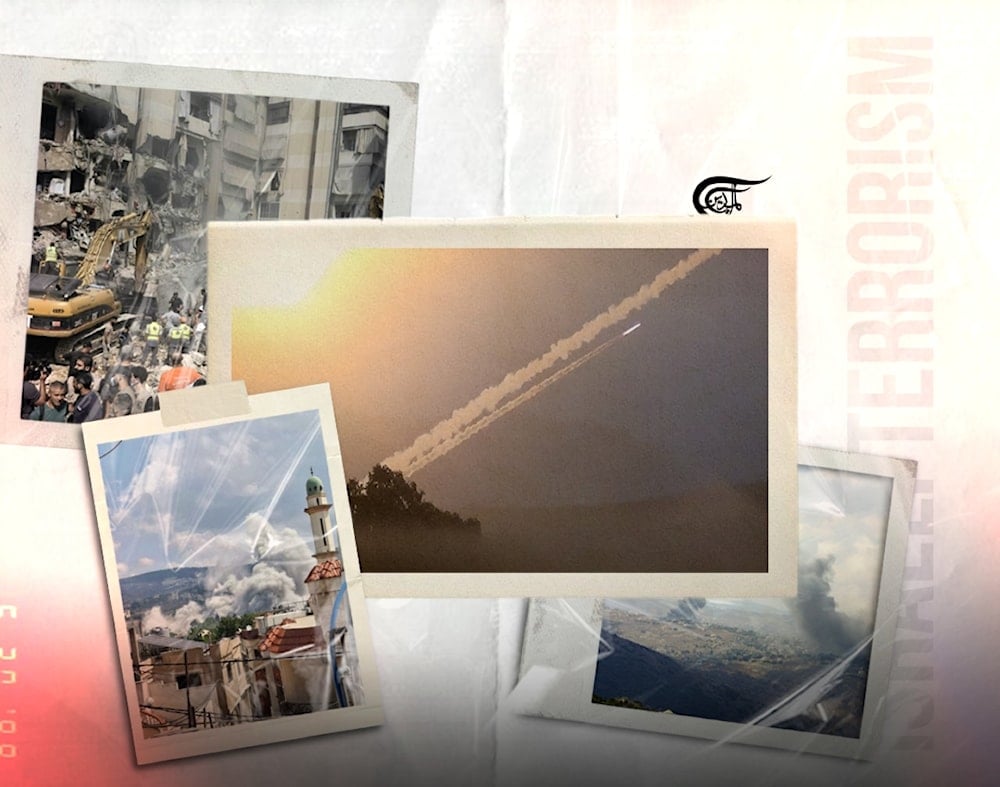Israeli terrorism In Lebanon reflects weakness, not strength
The PLO made the mistake of hesitating and miscalculating prior to 1982, and the Israelis are hoping that they will see a repeat of this scenario, yet are militarily already exhausted and incapable of invading Lebanon as they did in the past.
-

We have now entered into a transitional period and the Israelis don’t believe in red lines, rules, or international law. (Al Mayadeen English; Illustrated by Batoul Chamas)
The terrorist actions carried out by the Israeli regime in Lebanon over the past week have inflicted real blows that cannot be denied, however, they must be understood in context and the next moves will perhaps shape the outcome of a now regional conflict.
The Zionist Entity’s detonation of thousands of wireless communication devices (pagers) across Lebanon on Tuesday, which was followed by the detonation of walkie-talkie devices the very next day, represented a serious blow against not only Hezbollah, but also the people of Lebanon. The terrorist tactic was designed to achieve two goals, to instill fear in the civilian population and also create chaos within Hezbollah itself.
Such a tactic is only truly useful militarily if it is immediately followed by a larger armed action, yet the Israelis did not choose to launch a war. So, injuring thousands and killing dozens, both civilians and Hezbollah members, can be interpreted more so as point scoring for the Zionists, rather than a death blow attempt.
Similarly, with "Israel’s" assassination strikes, whether it be the murder of Hezbollah commander Fouad Shokor in late July, or Friday’s attack that targeted Radwan force officials, these are intended to be point scoring attacks. The fact that dozens of civilians were murdered during these assassination strikes in the Lebanese Capital further affirms this point.
Therefore, the Zionist regime’s actions have to be seen as primarily functioning on a psychological level. The tactical achievement for the entity is the terror, anxiety, and sense of a loss of security that these actions result in, which is text book terrorism. Although what we have recently witnessed over the past week may be unprecedented in the history of the conflict, in terms of the scale, the tactics themself are nothing new at all. This is out of the same playbook that the Zionists used during the 1970’s and 1980’s in Lebanon specifically.
The fact that the Israelis have not launched a full-scale war after 11 months of non-stop fire from Lebanon, demonstrates just how weak they are. Even if we look at what triggered the Israeli invasion of 2006, Hezbollah has far outdone the actions that led to this outcome, and yet the Zionists use dirty terror tactics to avoid initiating an all out war.
Where this leads
Although we cannot downplay the severity of what has been done, or undermine the sheer recklessness and criminality at play, these aggressions come out of a place of absolute desperation from the Zionist regime.
The big takeaway here is that Israeli Prime Minister Benjamin Netanyahu has not yet launched a war against Lebanon and instead is wedded to sneaky and rather imaginative attacks that border on the insane. The reason why he wasn’t able to launch a comprehensive war is because his forces are incapable of winning such a conflict, especially if it involves any ground component.
If the Zionist Entity wants to launch a ground invasion of Lebanon, it is more than likely that it will choose to invade southern Syria too. Such a war would be the most costly in the regime’s history and could even lead to its total collapse.
Despite understanding that a war with Hezbollah is unwinnable, it is also clear that the Israeli leadership are actually pushing for such a conflict, but under one of two scenarios: They either seek a limited battle, not a full-scale war, or, they will need to drag the US into a broader conflict that likely involves Iran.
In order to receive the backing of the United States and legitimacy from their Western allies, the Israelis need Hezbollah to be the ones to start the war. This is why they are continually provoking the Lebanese Resistance, in an attempt to put them in a corner and force them to respond in a way that would justify the Israeli desired outcome.
In the minds of the Israeli and US leaderships, they believe that a war with Lebanon will have to result in a stalemate, which will then take Hezbollah out of the equation when it comes to ending the conflict with Gaza. This is what the recent aggression is all about, isolating the fronts.
Since October 8, Hezbollah has been a thorn in the side of the Israeli regime and has dealt it countless blows economically, psychologically, and militarily. This inflicted a serious wound on the Israeli public's perception of their leadership and also made the Zionist entity appear weak regionally.
What has to be understood is that this war is being fought on the psychological front, as much as it is on the battlefield. Knowing this, the Zionist regime’s actions have sought to damage the image of Hezbollah and Iran in order to make up for the damage that has been inflicted on the Israeli image of strength that has now evaporated. So, in this context, the Israelis are taking risks.
Meanwhile, the strategy of the Lebanese Resistance is very clear, it seeks to work as a support front for the Palestinian Resistance in Gaza and to maintain a war of attrition along the border area. They refuse to abandon this mission, which is costing the Israelis greatly and represents the only means of pressure being exerted on the Zionists to give up in Gaza and sign a ceasefire agreement.
The Israelis, with the full backing of the United States, have decided that the main front in their war will now be Lebanon. This comes as a result of their failure to achieve any key goals inside Gaza.
If we look at the Zionist ground invasion of the Gaza Strip, we will see that they had no idea what they were doing from the get go. They began with a comprehensive bombing campaign while floating the ideas of annexing northern Gaza and ethnically cleansing the population to the Egyptian Sinai. After this, they invaded the North, achieving nothing after raiding al-Shifa Hospital in Gaza City. Then, they stormed Khan Younis, along with areas in the center of the besieged coastal enclave, claiming in each area to be going after the “Hamas headquarters”. Following this, they threatened the invasion of Rafah for around five months, after which they suddenly invaded upon the announcement by Hamas that they had accepted a ceasefire proposal on May 6.
Predictably, they achieved nothing in Rafah and were then put in a difficult position, ordering random invasions of areas they had already entered and suffering military casualties for no reason. Time after time, they were shocked that the Palestinian Resistance was still strong and would lure them into ambush after ambush. This, as they continued killing their own captives and received mounting pressure from their own population to sign a ceasefire/prisoner-exchange, leading to the Israeli public pouring onto the streets and demanding the return of their prisoners from Gaza.
Naturally, the Israeli leadership was looking for a new way out and decided to carry out the assassination of Fouad Shokor in Beirut, and also killed the leader of Hamas, Ismail Haniyeh, in Tehran. These were also actions carried out with two intended goals: Drawing the Iranians and Hezbollah into a war, in addition to dealing a blow in the ongoing propaganda battle.
These kinds of sneaky assassination operations have put the regional Resistance in a difficult position. The Resistance wants to support Gaza and help the Palestinians achieve a strategic victory, while slowly breaking the back of the Israeli regime. The Zionist leadership has understood this and has no way out of the corner it has put itself in, other than to lash out and hope to bring in the United States to save it. It is clear that this is viewed as an existential crisis by the Zionist regime, and it is. Therefore, it wants to transform the battle in order to get out of the mess it finds itself in.
The Resistance now has to make some bold and creative choices. It can continue to endure the most outrageous acts of terrorism, while maintaining a support front for Gaza and refusing to engage in an all out war, or, it can change the nature of the war entirely. Deterrence cannot be achieved against the Israelis at the current time because they are in a corner and don’t adhere to any rules whatsoever. If the decision is to avoid all out war, there will be many more Israeli provocations and war crimes that will only get worse if the previous ones go without significant answers, yet if significant responses come then this will likely justify an Israeli war of aggression. The Zionists will likely try to carry out more acts of terrorism against Iran as well during this time.
As the Secretary General of Hezbollah, Sayyed Hassan Nasrallah, said in his speech on Thursday last week, all red lines have been crossed. So, we now wait to see what punishments will come and how this conflict will change. Regardless, we have now entered into a transitional period and the Israelis don’t believe in red lines, rules or international law; they believe they are fighting to prevent their destruction. The PLO made the mistake of hesitating and miscalculating prior to 1982, and the Israelis are hoping that they will see a repeat of this scenario, yet are militarily already exhausted and incapable of invading Lebanon as they did in the past. In light of the criminal nature of this genocidal regime, it is possible that this moment in history will be decisive.

 Robert Inlakesh
Robert Inlakesh
 9 Min Read
9 Min Read











